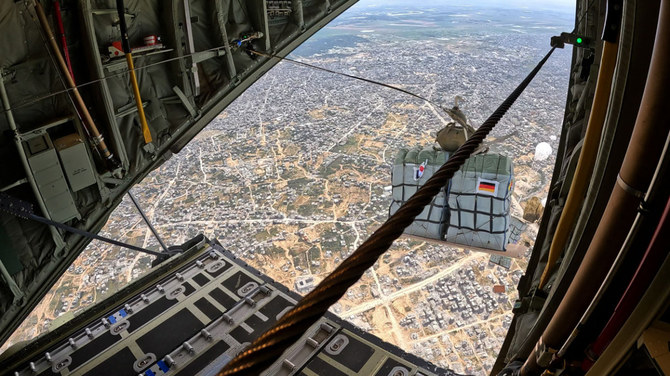
Hezbollah leader assassinated in southern drone strike on car
Beirut’s Rafic Hariri International Airport continues to suffer effects of hacking
BEIRUT: Lebanese leaders stepped up diplomatic efforts on Monday to contain hostilities from escalating between Israel and Hezbollah, as Israeli Prime Minister Benjamin Netanyahu renewed his threats against the Lebanese group.
This came as tensions mounted on the border of the two countries following the killing of a senior Hezbollah commander on Monday as he traveled in a car in the south of Lebanon.
Lebanese Foreign Minister Abdullah Bu Habib announced on Monday that US envoy Amos Hochstein would be informed during his upcoming visit about the need to implement UN Security Resolution 1701, which entails a return to the armistice line of 1949 between Israel and Lebanon.
“This requires Israel to withdraw from all Lebanese territory and cease its violations of Lebanese land, sea, and air. If Israel complies with these conditions, Lebanon will have no problem,” Habib said.
The minister made the comments after meeting Lebanon’s caretaker Prime Minister Najib Mikati.
Habib said he also expects several foreign ministers from various countries to visit Lebanon, and whose identities would be revealed “when the time is right.”
On Monday, the Israel Defense Forces used a drone to attack a car on the road to Khirbet Selm in the Bint Jbeil district, killing Wissam Hassan Al-Tawil, a leader of Hezbollah’s Radwan Force.
After the assassination, sirens sounded in Israeli settlements on the border with Lebanon, including Kiryat Shmona, Margaliot, Metulla, Misgav Am, Baruch, and Kfar Giladi.
Israeli bombing of southern Lebanese villages with phosphorus bombs continued, targeting the border town of Al-Adisa and the village of Khiam.
In return, Hezbollah announced that it targeted Israeli military sites, including the Hadab Al-Bustan site and the Ruwaisat Al-Alam site in the occupied Lebanese Shebaa Farms.
Following a hack over the weekend, meanwhile, computers and information screens at Beirut’s Rafic Hariri International Airport remained compromised on Monday.
Lebanese security services have not yet identified the source of the attack or been able to resolve the issue.
The hacking incident disrupted the BHS baggage inspection system, but has not otherwise impacted incoming or outgoing flights.
The airport continues to operate normally, as confirmed by Transport and Public Works Minister Ali Hamieh.
In a press conference, Hamish clarified that “drastic measures have been taken since Sunday evening, including disabling the internet at the airport after the cyberattack that caused damage.”
He said the matter “concerns the Lebanese state and that the results of the investigation will be issued in a few days.”
The minister confirmed no arrests have been made so far.
“We can’t tell whether someone inside or outside the airport caused it or whether the Israeli enemy is responsible for it,” he said.
In the unprecedented hack, the departure screens and computers at the airport displayed a message signed by “Jnoud Al-Rabb” (soldiers of God) saying: “This is Rafik Hariri Airport, not Hezbollah and Iran’s airport.”
The message added: “No one will support Hezbollah chief (Hassan Nasrallah) if he drags Lebanon into a war.”
The text addressed Hezbollah, saying: “We will not fight on behalf of anyone. You blew up our port, and now you want to blow up our airport by bringing in weapons. Let the airport be freed from the grip of the statelet.”
Hamieh said: “The computers controlling the monitors and the flight trackers were unaffected as they have their support systems. The airport registered the departure of 3,000 people over the past hours.”
He added: "The competent bodies at the airport adopted an alternative plan, where they inspected the baggage manually and used police dogs following the hacking of the inspection devices, preventing the electronic screening of the baggage contents.”
One observer suggested the purpose behind the breach might be to “prevent the inspection of some things passing through the airport without being controlled amid the confusion that occurred, as the security bodies were incapable of finding out what had happened hours after the cyberattack.”
The airport, which caters to passengers traveling to and from Lebanon and Syria, has long been an Israeli military target during previous attacks on Lebanon, and since the start of the war in Gaza and southern Lebanon has been subject to frequent Israeli jamming operations.












